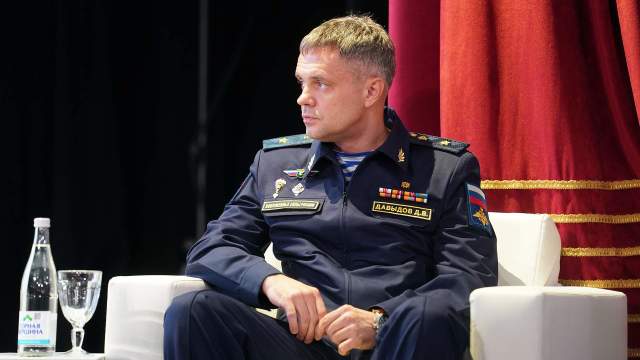Head of the hospital named after Burdenko Denis Davydov — about the influence of the SVO on the development of military medicine and prosthetics on the front line
Almost all the wounded who enter Russian hospitals from the SVO zone return to service, and the mortality rate does not exceed 0.45% — this is several times less than during military conflicts of the recent past, Denis Davydov, head of the N.N. Burdenko Main Military Clinical Hospital, said in an interview with Izvestia. Over the past year and a half, Russian military doctors have gained a unique experience that no other country in the world has, he is sure. What this experience is, why the nature of wounds has changed, what operations are now being performed right on the line of combat contact and how modern exoprostheses allow soldiers to remain in service — read in the conversation of Izvestia with Denis Davydov.
"The means of destruction have changed a lot"
— What are the features of a special military operation in comparison with previous conflicts from the point of view of military medicine?
— ITS colossally different from the fighting that we faced 15-20 years ago. A huge number of unmanned means of destruction are used, which do not require the direct participation of people. The means of destruction have changed a lot, they have become more sophisticated.
We see that there are relatively few bullet wounds — about a quarter. The rest are mine-explosive and fragmentation. And the wounding elements have become different: materials that cause the most damage are now being selected for them, and there are a lot of them.
The medical service had to study all this very quickly and adapt quickly. It turned out, in general, quite successfully.
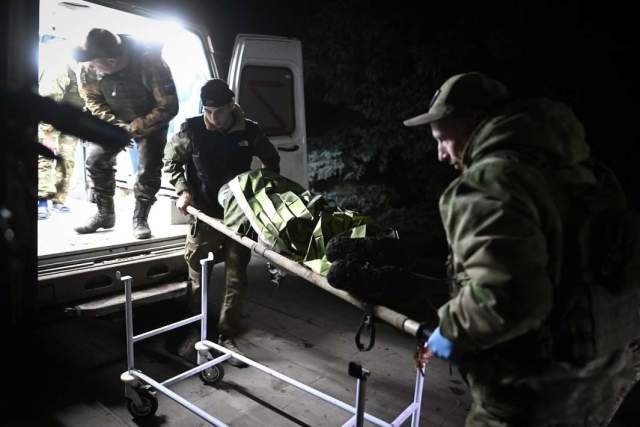
Medical personnel deliver the wounded to the frontline hospital
Image source: Photo: RIA Novosti/Stanislav Krasilnikov
— We are communicating at the International Forum on Surgery of Modern Armed Conflicts. Do Russian military doctors have something to tell about it, based on their own experience?
— There are a number of technologies that we could not imagine using on the battlefield 10-15 years ago, but today it is the practice of military doctors. First of all, this is prosthetics of the main functions of the body — the heart, lungs — directly on the line of combat contact. This technique is called extracorporeal membrane oxygenation (ECMO). Previously, damage to large vessels, heart, lungs inevitably led to death. Now, immediately after being wounded, almost in the trench, we can adjust this system and ensure the functioning of the vital functions of the body.
We have learned to immobilize the wounded quickly enough. We have rod devices that help to completely immobilize a segment of any limb in 15-20 minutes.
These technologies were previously unavailable so close to the war zone. Now it allows us to save the lives of servicemen, prepare them for transportation faster, anesthetize them, carry out anti-shock measures and then transport them for further treatment.
Today we have stronger drugs: painkillers, antibiotics, medicines that help to correct the psychological state of military personnel.
"Exoprostheses have reached a new level"
— It was said at the forum that the concept of "non-transportable wounded" is disappearing. Was it really possible to solve this problem?
— The Afghan and Chechen campaigns confirmed the experience of the Great Patriotic War: medical evacuation measures have their own laws, and they must be strictly observed. Many pathologies were considered a contraindication for transportation. Now we can say that only head injuries remain such an obstacle: it is necessary to be careful there, and it is impossible to evacuate immediately after injury or surgery. As for the damage to all other segments of the body, we can safely deliver any wounded person in any condition to the stage of highly qualified medical care.
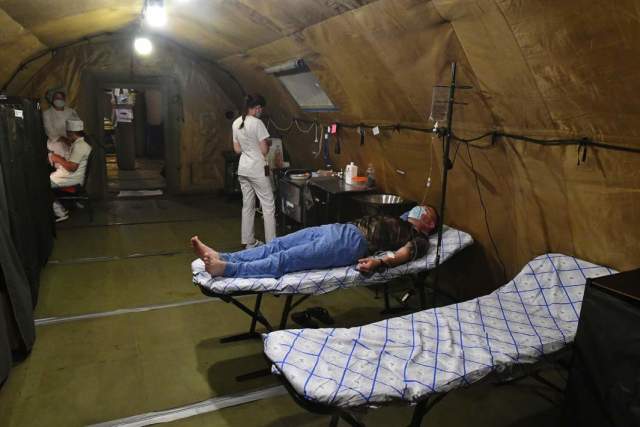
Medics and a soldier in a tent of a field hospital in the zone of a special military operation in Ukraine
Image source: Photo: RIA Novosti
— Has it been possible to reduce the mortality rate among the wounded?
— Hospital mortality now does not exceed 0.45%. And this is a colossal breakthrough of the military medical service. In the Great Patriotic War, this figure was 7.5%, in the Afghan campaign — 4.4%, during the fighting in the North Caucasus — 1.1%. And as for the hospital mortality in the APU, it is many times higher.
— One of the topics discussed at the forum is an increase in the proportion of wounded who return to service after treatment. What is the dynamics here?
— In the Great Patriotic War, doctors returned about 75% of the wounded to service. Now it is possible to return 98%. The rest are forced to commission for health reasons.
Previously, people with an amputated arm or leg had to resign from the Armed Forces. With rare exceptions, of course: we remember them from literature — for example, the pilot Alexei Maresyev. Now it has become a common occurrence.
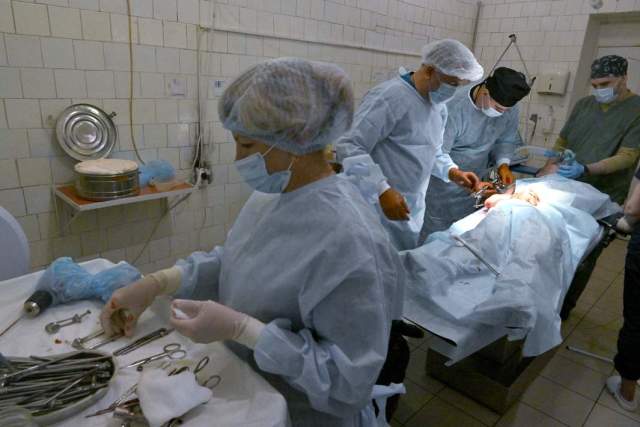
Military medics of the medical battalion of the Armed Forces of the Russian Federation perform an operation in a hospital in the Luhansk People's Republic
Image source: Photo: RIA Novosti/Evgeny Biyatov
— What is the reason for this?
— Firstly, a new level of exoprostheses. Passing by, you won't even notice that a person is missing a limb or its segment, and it is replaced by an exoprosthesis. And besides, we have quite a lot of positions, and there is a need for these people to continue serving in the Armed Forces and continue to help the army.
After severe injuries, people return to service in the units where staff work and training are conducted. These people have a lot of experience, the Ministry of Defense needs them.
Even on rounds that we constantly carry out in the hospital, many of those who have serious injuries ask: "Can I stay in the ranks of the Armed Forces? I want to continue serving, please leave me." Naturally, we are doing everything possible to socialize them and prevent the army from losing experienced servicemen.
"Many civilian doctors came as volunteers, left for the SVO zone"
— What problems do military medics most often face?
— It is very difficult for us to fight the resistance of microorganisms, their growing resistance to antibiotics.
We also need technologies that allow us to safely prosthetize the vital functions of the body.
Materials are needed that will be even more inert and will not interact with bone and soft tissues, will allow to individualize the design. Although already now the lion's share of designs, in fact, is printed on a 3D printer and has an individual character for a particular wounded or injured person. This needs to be developed, this is the future.
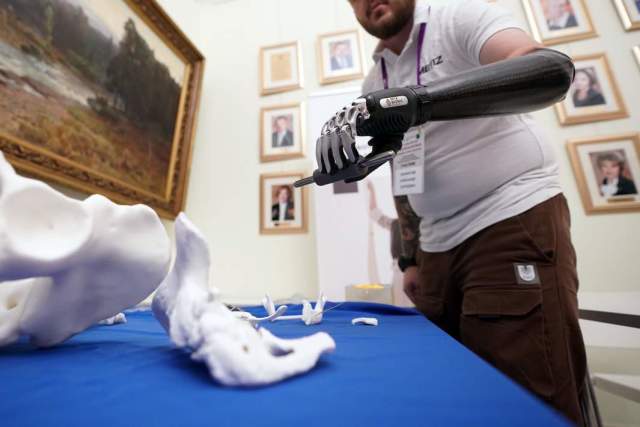
Photo: IZVESTIA/Pavel Volkov
Image source: iz.ru
— Do you feel support from your civilian colleagues?
— After the start of the special military operation, civilian hospitals, institutes, federal and other centers called and offered help. Many doctors came as volunteers, left for the SVO zone. And now many people travel, sign a contract for military service. We were not left alone. The Medical Service of the Armed Forces felt the shoulder, saw that it had a huge resource to replenish its ranks with qualified specialists. And these people do not come under compulsion and not in search of some benefit, but at the behest of the heart.
The North Atlantic Alliance is actually fighting against us, which has a huge amount of technology, people, resources, money, and opportunities. We are opposing, in fact, alone. But time has shown that we have turned from twigs into a bundle that cannot be broken. Our level of consolidation is one of the keys to success.
Roman Kretsul
